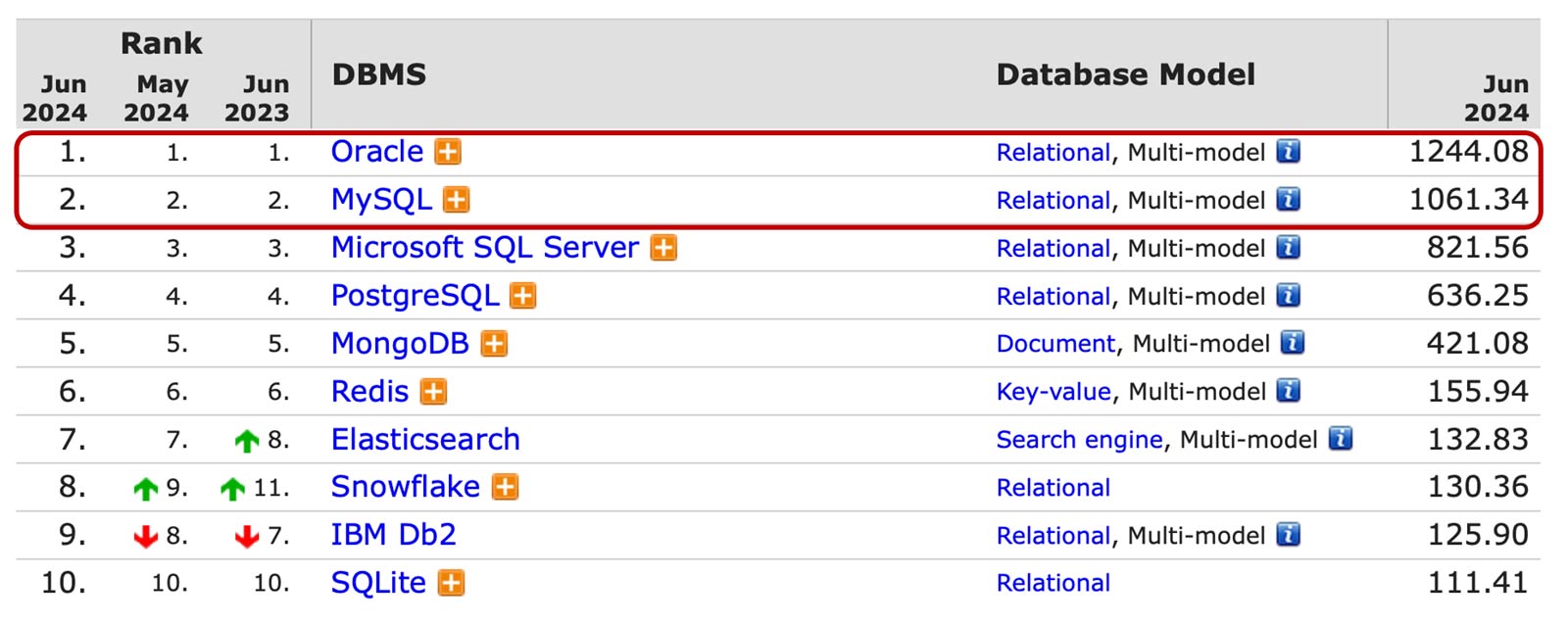Migration from MongoDB to MySQL
MySQL is the world’s most popular open source database. Migrating from MongoDB to MySQL provides the following benefits:
Business benefits:
- Increase revenue: MongoDB is not suitable for Transactional OLTP e-commerce applications. MySQL is proven for OLTP applications.
- Reduce costs: MongoDB customers will need a separate RDBMS for SQL. MySQL can do both SQL and NoSQL applications.
- Eliminate vendor lock-in: MongoDB uses the proprietary MQL language. MySQL uses the standard SQL language, which is supported by most of the leading databases, providing customers with choice.
Technical benefits:
- Eliminate complexity: instead of the complexity of using MongoDB for NoSQL, and a RDBMS for SQL, choose the simplicity of MySQL for SQL and NoSQL in a single database.
- Proven SQL: rather than taking the risk of MongoDB’s proprietary MQL language, with MySQL you gain the proven ecosystem of the industry standard SQL language.
- Improve security: MongoDB increases security risk with unnecessary data duplication, lack of data constancy, etc. With MySQL you gain the security of the proven RDBMS and SQL ecosystem.
MySQL: The World's Most Popular Open Source Database
MySQL is the world's most popular open source database because of its reliability, high-performance, and ease of use. MySQL combines the benefits of the most widely adopted open source database solution with high quality, 24x7 support, training and consulting services delivered by Oracle, the world leader in database technology.
According to DB-Engines, Oracle and MySQL are the world’s #1 and #2 most popular databases. MongoDB is ranked #5 and is much less popular than MySQL.

7 of the Top 10 Most Popular Databases are Relational Databases
7 of the top 10 most popular databases are relational databases with Oracle and MySQL securing the #1 and #2 positions. There is only one document database in the top 10 most popular databases.
Relational databases have been proven for many decades and are the foundation of most mission critical enterprise database applications. MySQL and relational databases provide the following benefits:
- Structured data model which ensures consistency
- Data integrity and relationships to prevent data duplication
- Robust querying with universally accepted SQL
- ACID compliance for data reliability
- Elimination of data redundancy for a single source of truth
- Mature ecosystem, tools, and community experts
MongoDB is a document database which doesn’t provide the same level of support for the features that make relational databases so popular. Developers and DBAs should use caution and be aware of the complexities they will face due to the following limitations:
- Unnecessary data duplication
- Lack of data consistency
- Incomplete transactional guarantees
- Limited point in time data integrity
- No JOIN support
- Slower performance
SQL is the most ubiquitous query language
SQL is a ubiquitous and powerful standard, allowing developers and DBAs to perform simple and complex queries on small and large amounts of data. According to JetBrains, SQL is one of the top 5 languages used by 52% of developers in the last 12 months. The universal acceptance of SQL ensures compatibility and interoperability across systems and applications. Furthermore, the mature ecosystem around SQL includes a wealth of tools, tutorials, and community support, for beginners and experts.
MongoDB relies on the proprietary MongoDB Query Language (MQL). Unlike the widely implemented and used SQL standard, MQL is proprietary and locks you into MongoDB.
MySQL Document Store: NoSQL + SQL
MySQL Document store gives users maximum flexibility developing traditional SQL relational applications and NoSQL schema-free document database applications. This eliminates the need for a separate NoSQL document database, saving costs and eliminating the need for specialized skills. Developers can mix and match relational data and JSON documents in the same database as well as the same application. For example, both data models can be queried in the same application and results can be in table, tabular or JSON formats. MySQL Document Store overcomes many of limitations of document databases by providing the same advantages for schema-less JSON documents as you get for relational data:
- Full data consistency
- Transactional data guarantees
- Power of SQL
HeatWave Database Service: OLTP, OLAP, Machine Learning, GenAI
HeatWave is a fully managed database service that includes:
- HeatWave GenAI for integrated and automated generative AI
- HeatWave AutoML to automate the machine learning pipeline
- HeatWave Lakehouse to query data in object storage and MySQL
- HeatWave MySQL to accelerate query performance
MongoDB Atlas is a fully managed MongoDB service. However, MongoDB Atlas has the same in inherent limitations that make it unsuitable for relational database applications.